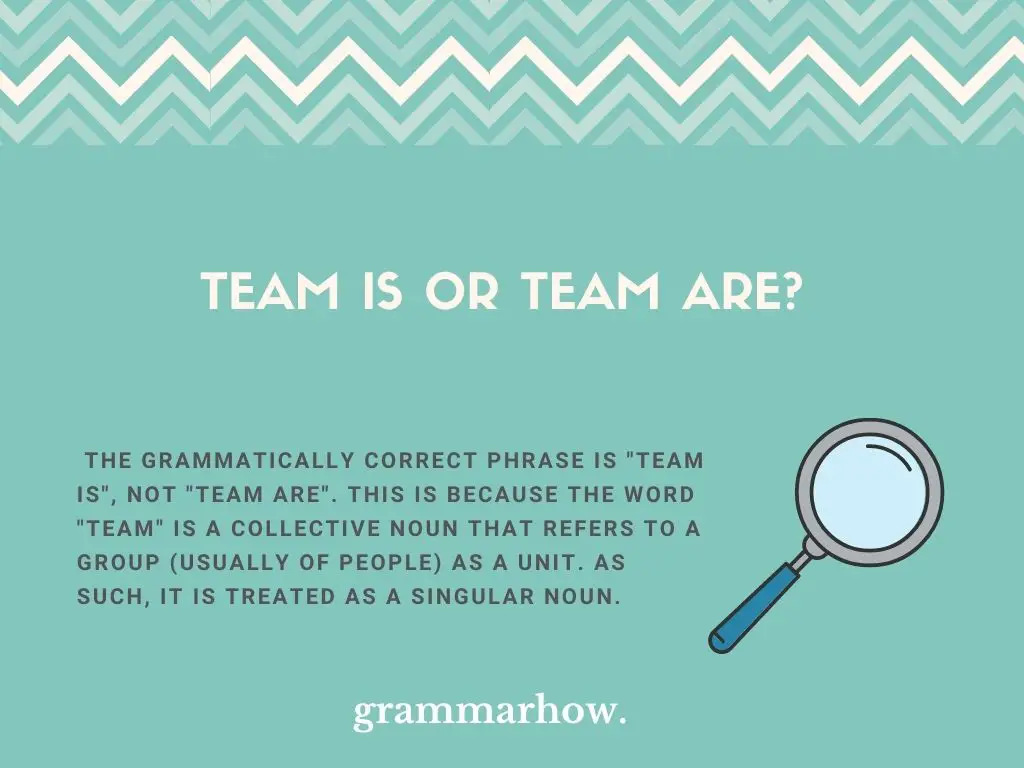The subject-verb agreement can be one of the most complicated aspects of the English language. If you’re confused about whether to treat the word “team” as a singular or a plural noun, this article will clear things up for you.
Team Is or Team Are?
The grammatically correct phrase is “team is”, not “team are”. This is because the word “team” is a collective noun that refers to a group (usually of people) as a unit. As such, it is treated as a singular noun.

In general, the rule is that when a noun is singular it should be followed with the word “is”, not “are”. But it becomes more complicated when collective nouns like “team” come along.
In the case of the word “team”, it is a collective noun that refers to a group (usually of people, but it can sometimes be of animals, etc.) as a unit or a singular thing. Because of this, it is treated as a singular noun. The phrase is, therefore: “team is”.
The word “are” can be used after the word “team” only if there are multiple teams, if the discussion involves team members, or if the discussion involves a team and someone or something else.
Team Is
The phrase “team is” is the grammatically correct way to describe a team’s state of being, under the subject-verb agreement.
The word “is” is a conjugation of the verb “be”, which describes a state of being. “Is” is the form of the word used when the noun preceding it is singular.
Because “team” is a collective noun that treats multiple people as a unit, it is considered a singular noun.
Below are examples of how to use the phrase “team is” in a sentence:
- My team is ready to upstage your team’s show.
- Our team is well-prepared for tomorrow’s presentation, sir.
- Samantha’s team is working on the powerplant issue.
- Her team is not going to the company retreat.
- While your team isn’t ready, his team is.
- Their team is far superior to ours, which is why we need to be prepared for anything.
- The team is working on the proposal while the boss is out getting a massage.
Teams Are
When there is more than one team, the correct way to describe the multiple teams’ state of being is the phrase: “teams are”.
The word “team” is considered a singular noun because it treats multiple people as a single entity. When there are multiple teams, the word to use becomes “are” instead of “is” under the subject-verb agreement.
Below are examples of how to use the phrase “teams are” in a sentence:
- My teams are miles ahead of all of yours.
- The teams are all on their mark, Coach.
- Several of Lorraine’s teams are already on this project, you do not need to add yours as well.
- All of the district’s debate teams are dismayed to see the state of the local elections.
- The football and basketball teams are ready to leave for their respective championships.
- Only a few of her teams are back, we need all the help we can get.
- The chess and checkers teams are both ready to compete, rain or shine.
“Me and My Team Is” or “Me and My Team Are”?
The grammatically correct was to put it is “me and my team are”, instead of “me and my team is”. While we treat “team” as a singular noun on its own, we treat it as plural when the discussion involves a team and someone else.
The word “team” is treated as a singular noun when it is by itself. This is because while it refers to multiple people, it treats them as a single entity.
When the word “team” is discussed along with another entity, the verb has to change to reflect this. Thus, when the subject is “me and my team”, there are two entities being discussed: “me” and “my team”.
The verb that follows should reflect the plural nature of the subject, which is why it should be “are”.
Take these two sentences for example:
- Me and my team are going to the national championships!
- Incorrect: Me and my team is going to the national championships!
When reading the sentences above, you can see that there is clearly something wrong with the second sentence, because the verb “is” does not agree with the subject.
Final Thoughts
The word “team” is a collective noun that refers to a group (usually of people) as a singular entity. This is why we treat it as a singular noun. Given this, the grammatically correct phrase is “team is”, not “team are”.
You may also like:
Team Which or Team Who or Team That? (Correct Version)
“Part of The Team” vs. “A Part of The Team”: Correct Version

Martin holds a Master’s degree in Finance and International Business. He has six years of experience in professional communication with clients, executives, and colleagues. Furthermore, he has teaching experience from Aarhus University. Martin has been featured as an expert in communication and teaching on Forbes and Shopify. Read more about Martin here.
